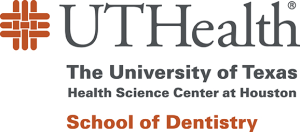Pediatric dentistry residency fosters bite-sized innovation
Published: October 14, 2021 by John Kriescher

Chelsea Wehr, DDS '19, MS '21, asked herself the same question that has sparked scientific progress throughout the ages: Is there a better way?
During her residency in the Advanced Education in Pediatric Dentistry Program at UTHealth Houston School of Dentistry, Wehr considered the traditional method of correcting cleft lip and palate in newborns: Infants have a manual impression taken of the inside of their mouths to create a wearable appliance that, along with surgery, corrects the defects. Yet even adults who get manual impressions dislike the process, and it often proves difficult and risky in new babies.
“With all the new developments in digital dentistry, I knew there had to be a better option,” Wehr says. “It turned out several of the other residents had been thinking along the same lines.”
The residency program trains dental school graduates to become pediatric specialists through a two-year course of study that emphasizes clinical practice, research, and didactic learning. Every resident conducts a research initiative during their second year, and Wehr set her sights on bringing cleft lip and palate treatment into the digital age.
在与儿童纪念赫尔曼医院的合资企业中,Wehr的项目在出生后不久对受影响的婴儿的脸进行了MRI扫描。该图像被馈送到软件程序中,以创建一个自定义的3D打印纠正设备。
“This can make the process safer and faster, and it opens the possibility that in areas without cleft lip and palate specialists, all they need is an MRI to send for a custom appliance,” she says.
Bhavini Acharya, BDS, director of the Advanced Education in Pediatric Dentistry Program, encourages residents to pursue hands-on research that will lead to tangible improvements for patients. One current initiative, for example, explores using virtual reality glasses to manage anxiety during treatment, while another looks at how child temperament affects the success of sedation.
“We also want them to understand how to identify quality research and apply it to their daily clinical practice,” she says. “As a provider, if they understand the evidence, then they can confidently educate the parents.”
即使他们教居民,小儿牙科教师在做出自己的研究贡献方面具有巨大的价值。beplay苹果手机能用吗例如,儿科牙科系主席DDS Gregory Olson与Muhammad F. Walji博士合作研究了不良事件和牙科质量措施。beplay苹果手机能用吗他们利用大数据来确定牙齿风险的常见措施是否准确指导护理。
“We know how great an impact proper dental care can have early in a child’s life,” Olson says. “We see the future—including dentistry—depending quite a bit on data, and we want to be in on early stages of that and its potential to better guide care.”
The residents gain an abundance of real-world experience alongside their research endeavors, developing the specialized clinical skills they will need to excel as pediatric dentists. At the school’s Pediatric Dentistry Clinic, they provide a wide range of treatment under faculty supervision, frequently caring for children with unique medical and behavioral complications.
They also conduct outside rotations with clinical partners like Children’s Memorial Hermann Hospital to learn pediatric medicine, general anesthesia, and emergency care.
“We teach the residents that establishing trust is first and foremost,” Olson says. “A lot of that trust happens through openness, transparency, and education. Our residents build a strong scientific foundation in human development and psychology, so they know how to interact with children based on their age.”
The COVID-19 pandemic has brought new challenges to the residency program, requiring quick adjustments. At the Pediatric Dentistry Clinic, residents and staff wear additional personal protective equipment, maintain strict social distancing protocols, and carefully manage scheduling to minimize waiting room traffic.
“This ability to adapt to new developments and think ahead has always been central to the residency program,” Acharya says. “And we want to make sure it always will be.”

